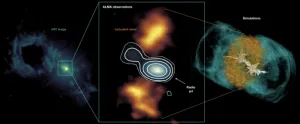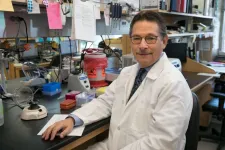(Press-News.org) The new Ngā Ahurei a Te Apārangi Fellows have been elected for their distinction in research and advancement of science, technology or the humanities to the highest international standards.
The University of Auckland is New Zealand’s leading research-led university, which Deputy Vice-Chancellor Research, Frank Bloomfield, says is largely due to the quality of its researchers, and the impact their work has within Aotearoa New Zealand and internationally.
“The research and scholarship of our new Fellows is regarded as world leading in their respective areas and as such, they have been recognised by the Royal Society Te Apārangi and its members.”
Vice-Chancellor, Professor Dawn Freshwater, says the University is proud of the new Fellows and their contribution to the reputation of the University.
“One of the key reasons we are among the top 100 Universities of the World* is the quality of our research, of which these 11 academics are exemplars.
“On behalf of staff, students and the wider University of Auckland community, I congratulate our new Fellows.”
The new Fellows are:
Associate Professor Mark Bolland, Medical Medicine, Faculty of Medical and Health Sciences
Mark Bolland has made major contributions to the treatment of osteoporosis. He led research establishing that calcium supplements increase the risk of heart attacks, and that these harms outweigh any benefits. This research has changed clinical practice: calcium supplements previously were taken by the majority of older adults, but are no longer routinely recommended. In New Zealand, prescriptions for calcium have fallen by more than 90 percent, saving the country more than $1 million per year.
He has also led research showing that vitamin D supplementation does not have important health benefits for otherwise healthy adults, and so is unnecessary, and that bone health is not a significant concern in HIV infection. Additionally, he developed techniques for checking the validity of research publications and exposed a major medical research fraud. In 2015 he was part of the team that won the Prime Minister’s Science Prize for work on osteoporosis.
Professor Klaus Bosselmann, School of Law
Klaus Bosselmann is an internationally renowned scholar of environmental law who has significantly contributed to the discourse on environmental ethics, policy, law and governance at national and international levels. The impact of his work on ecological legal theory, rights of nature, ecological integrity, eco-constitutionalism, the Earth Charter and legal developments internationally and in New Zealand is widely acknowledged.
Among his awards are the Inaugural Senior Scholarship Prize of the IUCN Academy of Environmental Law and the 2021 Carlowitz Sustainability Award. A number of his books have been translated into multiple languages including Im Namen der Natur (1992), When Two Worlds Collide (1994), The Principle of Sustainability (2008/2017), National Strategies for Sustainability (2014) and Earth Governance (2015).
Professor Virginia Braun, Psychology, Faculty of Science
Virginia Braun is a social and health psychologist, specialising in research related to gendered bodies, sex, sexuality, and health. Her scholarship interrogates possibilities for health and bodies, looking at the intersections of societal, scientific and public policy knowledge and meaning making. Exemplifying her impactful empirical work, Braun’s 2005 paper was the first to critically question the discourse, practice and implications of female genital cosmetic surgery, establishing her as a key international expert.
Exemplifying her extraordinary impact is her authorship of one of the most highly cited psychological and methodological papers ever published. She is invited to teach and present around the world, including as keynote at conferences across social, health and medical sciences, and her works have been translated into numerous languages. Braun received the Marsden Medal (2021) in recognition of her outstanding and sustained contributions to the profession of science.
Professor Gill Dobbie, Computer Science, Faculty of Science
Gill Dobbie is a world-leading computer science researcher who has made major contributions to the field of database management, particularly to the understanding of object-oriented databases, the design of semi-structured databases and the accuracy of stream data mining, all of which are fundamental technologies supporting the current ‘data science revolution’.
Her recent research in stream data mining has spawned several new research projects, where the characteristics of the data stream are used to adjust the algorithm in real time to provide superior results. A key concept in this research is to predict when a drift is likely to occur and make the drift detection algorithm more sensitive to it. This research can be applied to detect change in data streams, such as network traffic and the output of monitoring devices. This research has international importance, with the uptake of internet of things and data science.
Her experience led naturally to her appointment as the Science Leader on the Precision Driven Health Research Partnership, an award-winning research partnership between New Zealand’s health IT sector, health providers and universities. She has recently been appointed Chair of the Marsden Fund Council.
Professor Simon Holdaway, Associate Deputy Vice-Chancellor Research, Research Strategy and Integrity
Simon Holdaway’s contribution to the advancement of theoretical knowledge and development of innovative methodologies in archaeology is unique. His pioneering 2014 and 2017 books challenge the archaeological orthodoxy that the last 10 millennia saw an inevitable shift from simple to complex societies with studies in Australia and Egypt.
By examining in-depth case studies, he shows that changes during the last 10,000 years varied because of the local history of social and environmental interactions rather than the existence of a universal cultural historical evolution.
His multidisciplinary projects continue to overturn long-accepted interpretations for some of the classic archaeological locations worldwide. His research on stone artefacts, the commonest form of archaeological material culture, has initiated major reassessments worldwide.
Challenging archaeology’s foundational assumption of a relationship between complex stone artefacts and more evolved peoples, and the notion that stone artefact manufacture led to a single, desired end-product, he has pioneered large scale stone artefact analysis, writing both the current text on Australian stone artefacts and a series of innovative method and theory papers that challenge the worldwide orthodoxy related to stone artefact manufacture and typology.
Professor Paul Kilmartin, Chemical Sciences, Faculty of Science
Paul Kilmartin is an electrochemist by training who has applied electrochemical methods to fields as diverse as wine science and electrically conducting polymers. His novel findings in oenology have assisted New Zealand companies to produce high quality sauvignon blanc wines and gained him an international reputation within the wine science community.
These include findings that mechanical harvesting, juice oxidation and additives such as sulfites at harvest, play essential roles in the formation of the fruity and tropical aromas in New Zealand wines. His research on conducting polymers has resulted in new applications like sensing elements for the determination of antioxidants in beverages and biological fluids.
A further novel concept has been the consideration of conducting polymers as solid antioxidant materials, and the creation of functional biopolymers from grape marc waste, for use as food packaging materials to increase product shelf life.
Professor Nancy November, School of Music, Creative Arts and Industries
Nancy November is among the most innovative and eminent figures in the field of musicology. Combining interdisciplinarity and cultural history, her research centres on chamber music of the late eighteenth and nineteenth centuries, probing questions of historiography, canonisation, and genre. Her work in historical musicology achieves impact through deepening knowledge, critical thinking, and challenging the traditional view of music and its context.
Through her work in critical pedagogy, she continually strives to help develop other peoples’ historical perspectives, skills and awareness, not just for the maximum impact of her own research, but to develop tomorrow’s ‘critical beings’.
Her scholarship is based on an expansion and critique of the western classical musical canon, by means of multiple lenses: historiography, theory, gender studies, performance practice and aesthetics. Her work is recognised for challenging traditional pedagogies, grounded in western worldviews, with new, culturally-sustaining ways of teaching and learning history that are empowering, especially for Indigenous students.
Professor Christine Rubie-Davies, Learning, Development and Professional Practice, Faculty of Education and Social Work
Christine Rubie-Davies’ research has revolutionised the teacher expectation field and positively impacted education policy and classroom practice. Rubie-Davies advocated for a new discipline, the social psychology of education, drawing on education, social psychology, sociology, and educational psychology.
Accordingly, Rubie-Davies led the first-ever global conference in this discipline, resulting in a Routledge international handbook. Social psychology of education is now a globally recognised educational psychology sub-discipline.
Rubie-Davies’ transformational research identified teachers with high expectations for all students and documented their achievement-enhancing beliefs and practices. This resulted in her developing high expectation teaching theory, leading to a world-first randomised control trial that trained teachers to translate the theoretical principles into practice.
Consequently, Ministry of Education curriculum guidelines changed to include high expectations as a key teaching principle. International recognition is evidenced by research collaborations in seven countries, two US fellowships, and numerous invited presentations.
Emeritus Professor Helen Sword, Humanities, Faculty of Arts
Helen Sword is a world-leading expert on academic writing across the disciplines. As an international authority on modernist poetry, she has published books and articles that have expanded our understanding of the contradictory cultural and aesthetic forces at work in the poetry of twentieth-century authors, including Yeats, Eliot, Lawrence, H.D. and Rilke.
As a digital and performance poet, she has pushed against the boundaries of poetic convention and playfully illuminated the aesthetic spaces where print, performance and digital poetry intersect.
Sword has also transformed the international landscape of academic writing. Through books, articles and websites that have reached a wide and varied international audience, she has challenged the dusty conventions of scholarly prose, exposed the myths that hinder clear communication and issued a resounding call to arms against the lure of disciplinary jargon.
Her ground-breaking scholarship on academic writing has been praised by her peers for its rigorous evidence base and its skilful integration of theory and practice.
Professor Julia Tolmie, School of Law
For more than 30 years, Julia Tolmie has illuminated urgent legal challenges faced by women across the British Commonwealth. These include the defence of abused women facing murder charges, the over-incarceration of Indigenous mothers in parental failure prosecutions, the over-expansion of secondary party liability and the protection of women and children in family court proceedings.
Tolmie spearheaded a research programme that reconceptualises intimate partner violence (IPV) as a form of ‘social entrapment’. Revealing wider patterns of harm through agency records and trial transcripts, this work critiqued simplistic assumptions about IPV embedded in legislation, media coverage, government policy, and family violence safety responses.
It combined qualitative and quantitative analysis with feminist theories of violence, Indigenous scholarship on colonisation, research on precarity, and complexity theory to contribute a much-needed interpretative framework to the criminal justice system.
Locally and internationally, social entrapment has been recognised as providing a basis for new forms of engagement with IPV that better match its operation and harm. It has resulted in law reforms, informed the government work programme and improved judicial decision making.
Professor Andrew Allan, Biological Sciences, Faculty of Science
Andrew Allan, who works across Plant & Food Research and the University of Auckland, has had many leadership roles, including director of the Joint Graduate School linking Plant & Food Research and University of Auckland, where he has a joint appointment.
While contributing uniquely to the understanding of the metabolic control of pigmentation pathways, the genes he has described in publications are now used as markers in breeding apples, kiwifruit and other crops. Some thousands of seedlings continue to be screened using these markers.
His research has developed plants that undergo continuous flowering (apples, kiwifruit, and others) that promises to speed up perennial plant breeding many times, ensuring his impact will continue to grow.
This work forms the basis of his current MBIE-funded programme 'The Flowering Crisis' which aims to understand the effect of warming temperatures on flowering, as well as educating the public on new technologies. His programmes have specific objectives to enable Māori to inform the development, and be early adopters, of plants developed using these tools.
Royal Society Te Apārangi
Royal Society Te Apārangi supports all New Zealanders to explore, discover and share knowledge. To celebrate the discoveries of researchers, the Society awards medals and elects Fellows, who are leaders in their fields. These experts help the Society to provide independent advice to New Zealanders and the government on issues of public concern.
The new Fellows will be formally inducted at an event in Whanganui-a-Tara Wellington on 27 April 2023.
END
Leading Auckland University researchers elected to NZ Royal Society
The announcement of its new Fellows by the Academy of the Royal Society Te Apārangi sees 11 academics from the University of Auckland recognised for their world leadership in research and scholarship.
2023-03-21
ELSE PRESS RELEASES FROM THIS DATE:
Almost all countries around the globe criminalise abortion in some circumstances
2023-03-21
Almost all countries around the globe criminalise abortion in some circumstances, despite the public health risks and impact on human rights, finds a review of the scope of penalties for the procedure in 182 nations, published in the open access journal BMJ Global Health.
Some 134 countries penalise those seeking an abortion, while 181 penalise providers, and 159 those who assist in the procedure, the review shows.
The evidence indicates that criminalisation doesn’t deter women from deciding to have an abortion; rather, it limits or delays access to safe abortion and increases the need to turn to unsafe and unregulated services, point out the researchers.
Criminalisation ...
Pregnant women in road traffic collisions at heightened risk of birth complications
2023-03-21
Pregnant women involved in road traffic collisions—even those with minor injuries—are at heightened risk of potentially serious birth complications, including dislodgement of the placenta (placental abruption), very heavy bleeding, and the need for a caesarean section, finds a Taiwanese study published online in the journal Injury Prevention.
And the risks are even higher for those on scooters rather than in cars, the findings indicate.
Road traffic collisions are the leading cause of traumatic injury during pregnancy, with previously published research suggesting they account for up to 70% of such injuries. But most of the evidence base to date on the ...
Solar industry feeling the heat over disposal of 80 million panels
2023-03-21
The renewable energy sector is facing a quandary: how Australia will dispose of 80 million solar panels in an environmentally friendly way when they reach the end of their life.
Paradoxically, one of the reasons people are installing solar photovoltaic (PV) panels in huge numbers is to help the environment, but the industry is now grappling with the anticipated waste generated by 100,000 tonnes of panels due to be dismantled in Australia from 2035.
A new study led by the University of South Australia has proposed a comprehensive ...
Going beyond English is critical for conservation
2023-03-21
Research in languages other than English is critically important for biodiversity conservation and is shockingly under-utilised internationally, according to an international research team.
Dr Tatsuya Amano, from The University of Queensland’s School of Biological Sciences, led a worldwide study that investigated national reports on biodiversity conservation in 37 countries and territories where English is not an official language.
“Non-English-language literature is almost entirely neglected in global biodiversity assessments,” Dr Amano said.
“This means there’s a serious ...
Discovery of relativistic jets blowing bubbles in the central region of the Teacup Galaxy
2023-03-21
When matter falls into supermassive black holes in the centers of galaxies, it unleashes enormous amounts of energy and is called an active galactic nuclei (or AGN). A fraction of AGN release part of this energy as jets that are detectable in radio wavelengths that travel at velocities close to light speed. While the jet travels across the galaxy, it collides with the clouds and gas around it and in some cases may push this material away in the form of winds. However, which conditions preferentially trigger these winds to blow out the gas from galaxies are still poorly understood.
The ...
Promoting healthy longevity should start young: pregnancy complications lift women’s risk of mortality in the next 50 years
2023-03-21
In Singapore, about 15 to 20 per cent of pregnancies are complicated by gestational diabetes, 5 to 10 per cent of pregnancies are affected by hypertensive disorders of pregnancy, and more than 10 per cent of pregnancies end as pre-term delivery. Pregnancy is a critical reproductive event for women, with substantial life-long health implications.
This brings forward an important question: how would pregnancy complications inform women’s risk of mortality in the long-term? However, this is often understudied due to a lack of long-term ...
Richard McIndoe, PhD, will direct Coordinating Unit for new, national research initiative in diabetes, obesity
2023-03-21
AUGUSTA, Ga. (March 21 , 2023) – Richard McIndoe, PhD, a bioinformatics expert and director of the Center for Biotechnology and Genomic Medicine at the Medical College of Georgia, is leading the Coordinating Unit of a new national research initiative designed to move science forward in understanding common, life-changing metabolic problems like diabetes and obesity.
The National Centers for Metabolic Phenotyping in Live Models of Obesity and Diabetes, or MPMOD, is a multicenter initiative being established by the National Institute of Diabetes and Digestive and Kidney ...
3000+ billion tons of ice lost from Antarctic Ice Sheet over 25 years
2023-03-21
Scientists have calculated that the fastest changing Antarctic region - the Amundsen Sea Embayment - has lost more than 3,000 billion tonnes of ice over a 25-year period.
If all the lost ice was piled on London, it would stand over 2 km tall - or 7.4 times the height of the Shard. If it were to cover Manhattan, it would stand at 61 km – or 137 Empire State Buildings placed on top of one another.
Twenty major glaciers form the Amundsen Sea Embayment in West Antarctica, which is more than four times the size of the UK, and they ...
UCLA-led study uses base editing to correct mutation that causes rare immune deficiency
2023-03-20
A new UCLA-led study suggests that advanced genome editing technology could be used as a one-time treatment for the rare and deadly genetic disease CD3 delta severe combined immunodeficiency.
The condition, also known as CD3 delta SCID, is caused by a mutation in the CD3D gene, which prevents the production of the CD3 delta protein that is needed for the normal development of T cells from blood stem cells.
Without T cells, babies born with CD3 delta SCID are unable to fight off infections and, if untreated, often die within the first two years of life. Currently, ...
UC Irvine-led team is first to detect neutrinos made by a particle collider
2023-03-20
Irvine, Calif., March 20, 2023 – In a scientific first, a team led by physicists at the University of California, Irvine has detected neutrinos created by a particle collider. The discovery promises to deepen scientists’ understanding of the subatomic particles, which were first spotted in 1956 and play a key role in the process that makes stars burn.
The work could also shed light on cosmic neutrinos that travel large distances and collide with the Earth, providing a window on distant parts of the universe.
It’s the latest result from the Forward Search Experiment, or FASER, a particle detector designed and built by an international group of physicists and installed ...
LAST 30 PRESS RELEASES:
Scientists reveal our best- and worst-case scenarios for a warming Antarctica
Cleaner fish show intelligence typical of mammals
AABNet and partners launch landmark guide on the conservation of African livestock genetic resources and sustainable breeding strategies
Produce hydrogen and oxygen simultaneously from a single atom! Achieve carbon neutrality with an 'All-in-one' single-atom water electrolysis catalyst
Sleep loss linked to higher atrial fibrillation risk in working-age adults
Visible light-driven deracemization of α-aryl ketones synergistically catalyzed by thiophenols and chiral phosphoric acid
Most AI bots lack basic safety disclosures, study finds
How competitive gaming on discord fosters social connections
CU Anschutz School of Medicine receives best ranking in NIH funding in 20 years
Mayo Clinic opens patient information office in Cayman Islands
Phonon lasers unlock ultrabroadband acoustic frequency combs
Babies with an increased likelihood of autism may struggle to settle into deep, restorative sleep, according to a new study from the University of East Anglia.
National Reactor Innovation Center opens Molten Salt Thermophysical Examination Capability at INL
International Progressive MS Alliance awards €6.9 million to three studies researching therapies to address common symptoms of progressive MS
Can your soil’s color predict its health?
Biochar nanomaterials could transform medicine, energy, and climate solutions
Turning waste into power: scientists convert discarded phone batteries and industrial lignin into high-performance sodium battery materials
PhD student maps mysterious upper atmosphere of Uranus for the first time
Idaho National Laboratory to accelerate nuclear energy deployment with NVIDIA AI through the Genesis Mission
Blood test could help guide treatment decisions in germ cell tumors
New ‘scimitar-crested’ Spinosaurus species discovered in the central Sahara
“Cyborg” pancreatic organoids can monitor the maturation of islet cells
Technique to extract concepts from AI models can help steer and monitor model outputs
Study clarifies the cancer genome in domestic cats
Crested Spinosaurus fossil was aquatic, but lived 1,000 kilometers from the Tethys Sea
MULTI-evolve: Rapid evolution of complex multi-mutant proteins
A new method to steer AI output uncovers vulnerabilities and potential improvements
Why some objects in space look like snowmen
Flickering glacial climate may have shaped early human evolution
First AHA/ACC acute pulmonary embolism guideline: prompt diagnosis and treatment are key
[Press-News.org] Leading Auckland University researchers elected to NZ Royal SocietyThe announcement of its new Fellows by the Academy of the Royal Society Te Apārangi sees 11 academics from the University of Auckland recognised for their world leadership in research and scholarship.



